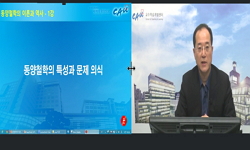Korea to form a variety of traditional concepts of space, nothing(無), empty(虚), naught(空), and immateriality is formed through the infinite space, the vitality of the tradition to give the idea that the background of this study was. These immate...
http://chineseinput.net/에서 pinyin(병음)방식으로 중국어를 변환할 수 있습니다.
변환된 중국어를 복사하여 사용하시면 됩니다.
- 中文 을 입력하시려면 zhongwen을 입력하시고 space를누르시면됩니다.
- 北京 을 입력하시려면 beijing을 입력하시고 space를 누르시면 됩니다.
https://www.riss.kr/link?id=A103785650
- 저자
- 발행기관
- 학술지명
- 권호사항
-
발행연도
2011
-
작성언어
Korean
-
주제어
동양 ; 전통사상 ; 비실체성 ; 한국 전통누정 ; Orient ; Traditional Idea ; Immateriality ; Korean Traditional Pavilion
-
등재정보
KCI등재
-
자료형태
학술저널
- 발행기관 URL
-
수록면
67-78(12쪽)
-
KCI 피인용횟수
1
- 제공처
-
0
상세조회 -
0
다운로드
부가정보
다국어 초록 (Multilingual Abstract)
Traditional immateriality of space, concurrency, design elements, the totality characteristics, and space time characteristics, building structural characteristics were extracted. By taking advantage of the formative elements than seowon mandaeru, hwaamsa woohwaru, defined through the analysis of deepwater Yangdong unreal how identity is reflected in the traditional pavilion space was contemplated for that.
For more traditional ideas and practices through the analysis of immateriality of the traditional space in the space given the ever-changing life and nature and the universe can hold open the possibility of space allows the possibility of these potential present in the infinite space The play of living space for us to offer more variety, space is given for recognition of novelty.
Korea to form a variety of traditional concepts of space, nothing(無), empty(虚), naught(空), and immateriality is formed through the infinite space, the vitality of the tradition to give the idea that the background of this study was. These immateriality characteristics of the traditional ideas of Confucianism, based on previous studies such as root idea the propriety (禮), is the foundation of Buddhism Hwaeom, and idleness(無为) of Taoism Lao Tzu and Chuang Tzu's idea check through, a traditional pavilion space, the immateriality was investigated in the melt. These attempts have a tradition of interpreting the space to form a more comprehensive perspective, and propose a new framework for spatial perception and could be seen that the finding is significant.
Traditional immateriality of space, concurrency, design elements, the totality characteristics, and space time characteristics, building structural characteristics were extracted. By taking advantage of the formative elements than seowon mandaeru, hwaamsa woohwaru, defined through the analysis of deepwater Yangdong unreal how identity is reflected in the traditional pavilion space was contemplated for that.
For more traditional ideas and practices through the analysis of immateriality of the traditional space in the space given the ever-changing life and nature and the universe can hold open the possibility of space allows the possibility of these potential present in the infinite space The play of living space for us to offer more variety, space is given for recognition of novelty.
참고문헌 (Reference)
1 이병권, "한국전통공간의 비실체성에 관한 연구" 국민대학교 2007
2 고익진, "한국의 불교시상" 동국대학교출판부 1991
3 서경요, "한국유교지성론" 성균관대학교 동아시아학술원 2003
4 주남철, "한국건축사" 고려대학교출판부 2002
5 이영미, "한국 전통건축의 공간분석을 위한 존재론적 접근" 전남대학교 2004
6 김태현, "한국 전통건축에서 보여 지는 건축공간의 깊이 표현에 관한 연구" 25 (25): 2005
7 한별님, "한국 전통건축공간의 구성 방법 에 관한 연구" 중앙대학교 2005
8 기무라 기요타카, "중국 화엄사상사" 민족사 2005
9 이인희, "전통사상에 의한 건축공간 구성방법에 관한 연구" 계명대학교 1996
10 김개천, "전통건축의 미의식과 현대 공간"
1 이병권, "한국전통공간의 비실체성에 관한 연구" 국민대학교 2007
2 고익진, "한국의 불교시상" 동국대학교출판부 1991
3 서경요, "한국유교지성론" 성균관대학교 동아시아학술원 2003
4 주남철, "한국건축사" 고려대학교출판부 2002
5 이영미, "한국 전통건축의 공간분석을 위한 존재론적 접근" 전남대학교 2004
6 김태현, "한국 전통건축에서 보여 지는 건축공간의 깊이 표현에 관한 연구" 25 (25): 2005
7 한별님, "한국 전통건축공간의 구성 방법 에 관한 연구" 중앙대학교 2005
8 기무라 기요타카, "중국 화엄사상사" 민족사 2005
9 이인희, "전통사상에 의한 건축공간 구성방법에 관한 연구" 계명대학교 1996
10 김개천, "전통건축의 미의식과 현대 공간"
11 리우사요간, "장자철학" 소나무 1998
12 김갑수, "장자와 문명" 논형 2004
13 금장태, "유학사상과 유교문화" 한국학술정보 2003
14 최영진, "유교사상의 본질과 현재성" 성균관대학교출판부 2002
15 최현각, "선학의 이해" 불교시대사 2003
16 스즈키 다이세쓰, "선이란 무엇인가" 이론과 실천 2006
17 김개천, "명묵의 건축" 안그라픽스 2004
18 홍승희, "동양사상의 관점에서본 상대주의 공간개념에 관한 연구" 건국대학교 2001
19 장파, "동양과 서양 그리고 미학" 푸른숲 268-, 1999
20 조민환, "노장의 미학사상에 관한 연구" 성균관대학교 1990
21 권영걸, "공간디자인 16강" 국제 2001
22 이동철, "21세기의 동양철학" 을유문화사 2005
동일학술지(권/호) 다른 논문
-
국내외 프리스쿨(Pre-School) 프로그램 연구를 통한 기초조형교육 활성화 방안 - 2010~2011학년도 평택대학교 프리스쿨(Pre-School) 수업을 중심으로 -
- 한국기초조형학회
- 박혜숙
- 2011
- KCI등재
-
영화 타이틀 로고타입의 캘리그래피 표현 연구 (2009∼2010년 상영된 영화 포스터 Title Logotype을 중심으로)
- 한국기초조형학회
- 정흥균
- 2011
- KCI등재
-
- 한국기초조형학회
- 김언정
- 2011
- KCI등재
-
Ricardo Legorreta 공간에 나타나는 지역주의 표현 특성에 관한 연구 : 비판적 지역주의 관점에서
- 한국기초조형학회
- 최보미
- 2011
- KCI등재
분석정보
인용정보 인용지수 설명보기
학술지 이력
| 연월일 | 이력구분 | 이력상세 | 등재구분 |
|---|---|---|---|
| 2027 | 평가예정 | 재인증평가 신청대상 (재인증) | |
| 2021-01-01 | 평가 | 등재학술지 유지 (재인증) |  |
| 2018-01-01 | 평가 | 등재학술지 유지 (등재유지) |  |
| 2015-02-09 | 학술지명변경 | 외국어명 : Bulletin of Korean Society of Basic Design & Art -> Journal of Basic Design & Art |  |
| 2015-01-01 | 평가 | 등재학술지 유지 (등재유지) |  |
| 2011-01-01 | 평가 | 등재학술지 유지 (등재유지) |  |
| 2009-01-01 | 평가 | 등재학술지 유지 (등재유지) |  |
| 2006-01-01 | 평가 | 등재학술지 선정 (등재후보2차) |  |
| 2005-01-01 | 평가 | 등재후보 1차 PASS (등재후보1차) |  |
| 2003-01-01 | 평가 | 등재후보학술지 선정 (신규평가) |  |
학술지 인용정보
| 기준연도 | WOS-KCI 통합IF(2년) | KCIF(2년) | KCIF(3년) |
|---|---|---|---|
| 2016 | 0.33 | 0.33 | 0.34 |
| KCIF(4년) | KCIF(5년) | 중심성지수(3년) | 즉시성지수 |
| 0.34 | 0.34 | 0.512 | 0.08 |




 KCI
KCI DBpia
DBpia






